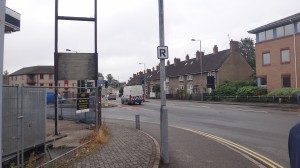I’d like to preface this particular blog post by saying that some of the things I’m about to say come from personal experience while other things have been told to our class by our History professor. All of these things, however, were rather shocking to me. I suppose I thought that because the U.S. and England shared both a history and a language that many of the customs and day-to-day life things would be the same. I was definitely wrong in that regard. It’s just familiar enough to lull you into a sense of security, and then BAM! something weird happens and you’re so wrong-footed you don’t know how to handle it. I say ‘weird,’ of course, meaning ‘not what I’m used to.’ So, here we go.
10. Cars. Cars in general. I mean, I knew that here they drive on the left side of the road, which was strange enough to conceive of, let alone deal with. But I was kind of expecting that weirdness. What I wasn’t expecting is the fact that pedestrians do NOT have the right of way here. If you accidentally step onto the street and a car happens to be coming at you, they probably aren’t going to stop. You can’t  cheat a little bit at the crosswalks and leisurely make your way across to the other sidewalk–if you think you’re not gonna make it while the little green man is telling you it’s safe to go, you gotta RUN before the cars start moving. So not only to I have to re-train myself to look for cars before crossing the street, I’ve also got to learn to not trust the drivers to stop for me if I screw it up.
cheat a little bit at the crosswalks and leisurely make your way across to the other sidewalk–if you think you’re not gonna make it while the little green man is telling you it’s safe to go, you gotta RUN before the cars start moving. So not only to I have to re-train myself to look for cars before crossing the street, I’ve also got to learn to not trust the drivers to stop for me if I screw it up.
9. Anti-wastefulness. There are more recycle bins in the house than there are trash bins, and double the amount of recycling bins to take to the curb on Friday mornings than there are trash bins. Apparently, all plastic, glass, paper, and cardboard is to be recycled. Which is cool, actually, but it takes some getting used to. In this same vein, the grocery stores charge you extra if you want to use their paper or plastic bags. Most people have those cloth bags that are reusable, and that is encouraged by the extra bag fee. Finally, the toilets are different in a couple different ways. I first noticed it in the house… the water level in the toilet, the part to stop the bathroom from smelling really bad, is much lower here than it is back home. Sensible, I thought, cutting down on water costs because apparently water is way more expensive here (as a side note, hour-long showers are unheard of. Our professor says most people are in and out in less than 15 minutes). But public toilets are even more anti-wastefulness. Sometimes you have to pay to go to the bathroom, like in the musical Urinetown. Even if you do get into the restroom, they tend to have pre-portioned out toilet paper, like it’s coming out of a Kleenex box. Presumably, this is to cut down on paper usage.
–small side note on this: there are very few trashcans in public places, especially in London. This has nothing to do with wastefulness, according to our professor. Trashcans were being used as bomb drops, so they stopped having so many in the city.
8. Racism. It’s not racism like we think of it, necessarily, although I suppose it could go that way. It’s not exactly negative, more of an acknowledgement of otherness. Maybe it’s because I’m specifically from America, but pretty much everyone I know is a mix of something–Irish, English, French, Norwegian, Swiss, Italian, Greek, African, Indian, Filipino, whatever. Not many Americans are pure anything. But here, people are English, or Irish, or Scottish, or French, or Black. To be frank, I’ve heard more about ‘Muslims’ and ‘how they behave’ here than I ever did back in America. I’m sure I was also fairly sheltered at home and I’m pretty good at not paying attention to things that make me angry, like racism and homophobia. I guess I just wasn’t expecting heritage to be as big of a deal to every other person here. I know culture and heritage are important to each individual person, of course, but there seems to be a different tone here.
7. Not patriotic. This was a big shocker for me. We’re all so gung-ho about America, even if we’re not thrilled about what America does. Most of us have an American Flag somewhere in our houses, and we dress up in red, white, and blue on Fourth of July, and we generally support our troops even if we don’t approve of what our troops are doing in a larger sense. There is a sense of camaraderie in being American that British people apparently don’t feel quite as strongly. Our professor says that British people were much more patriotic during the Victorian Era, the Age of Industrialization and Empire; that people flew the Union Jack in pride and reveled in being British. But apparently people ‘got over’ that when Great Britain was booted from it’s number one spot on the world stage. I’m sitting over here thinking that sounds a little bit like being a sore loser, but maybe that’s just cuz I still feel proud of being an American.
6. Not particularly religious. This one is similar to the patriotism thing. The British nation as a whole was extremely religious during the Victorian Era, but ‘got over’ that as well. Some credit this with the emergence of Darwinism and evolution as an alternative to the creation story, some think it’s because people just began to lose faith as Britain’s hold on their empire dwindled. Whatever the reason, not very many people here go to church on Sunday, I guess (keep in mind this is hearsay, I haven’t actually witnessed it). I suppose I was surprised by this because I naturally assumed that countries kept their level of religious-ness over time. I figured, since America was practically founded because of strong religious sentiment on both sides of the issue, that England must be really religious, or at least as religious as America is. I guess that, like many assumptions, is very incorrect.
5. Not family centered. This I actually find kind of hard to believe, what with the whole ‘nuclear family’ thing that is so prevalent in American society, even if we claim it’s not. We love our families, generally, and defend them and protect them and brag about them and tease them. We encourage each other and help each other and cheer each other up. According to our professor, British families aren’t quite like that. Instead of the typical ‘encouraging’ parent at a soccer game, for instance, saying “You did great!” and “Nice job!” a typical British parent would say something more like “You missed that open goal, what was up with that?” and “Were you daydreaming that whole time?” Now, I personally have not seen anything that extreme, but I have noticed parents treating kids more like nuisances than like children. This isn’t to say that the British don’t love their children–they absolutely do. They just don’t go for the whole ‘family values’ thing that we love. It’s no wonder they seem to grow up to be disillusioned adults, though, if this is true.
4. Don’t like ‘hard work.‘ And really, who does? Hard work is hard. But Americans seem to have the common belief that hard work will lead to a better future, a better job, a better life. Working hard now means that later you can chill out. Working hard at your job is a way to show dedication and possibly get a promotion or a raise. Working hard, for us, is a way of moving up in the world. British people seem to have given up on the idea that a hard working individual can ‘make it’ in this world. The only first -had experience I’ve had with this is the lack of customer service in stores. If the manager is doing something, or a cash register is acting up, or you need help, you can be sure that they will take their time getting to you. Customers aren’t a priority like they are back home. You just gotta wait for them to be done with whatever they were doing before you walked up. Our professor claims this is because the working classes were so oppressed by harsh capitalism in the Industrial Revolution that they gave up on the idea of working for a better life–life never got better for them.
3. Don’t like Americans. This isn’t actually quite as prevalent as I was expecting, but is real in a different way than I anticipated. It’s not really that they don’t like our politics, although that’s true. It’s not that they resent us for stealing the role as ‘number one’ in the world, although I kinda think that might be part of it. They mostly think we’re crazy. Crazy for believing in things like hard work and family and God; crazy for being so happy and optimistic all the time; crazy for rushing around everywhere in such a big hurry. The only first-had experience we’ve had is when we were at the hostel in London-a group of us met some English guys in the lobby and got to talking about the differences between Americans and Brits and how they can always tell when someone’s from America. They claim it’s because we’re always smiling and laughing. whereas Brits are more bitter about life. Not gonna lie, I think I like being American much more in this respect (in most of these, actually).
2. “Just coffee” doesn’t exist. If you walk into a coffee shop and order coffee, you’ll probably get a latte or espresso. And a weird look. Occasionally they have what they call ‘filtered coffee,’ but mostly to make coffee like we’re used to, we have to do it at home. I haven’t actually been to a Starbucks here yet, so I’m not sure if that holds true there as well, but I’m guessing it will. The girls here who wanted coffee actually had to go to a couple different stores to find filters for the ground coffee we found.
1. No frozen waffles. Okay, this is more of a personal issue than an issue with British culture in general. I just miss Eggo waffles, okay? They expect me to make full-on Belgian waffles in a waffle maker instead of just toasting some frozen ones. I really just want to pop some in the toaster and have strawberries and cream on top but I don’t think our house even has a waffle-maker, and I’d have to find a good waffle recipe somewhere. I may have found a suitable substitute today, but the jury is still out as I haven’t actually tried them yet. The crepes, however, kinda make up for it 🙂
So. This is what I’ve learned about British culture that I was 100% not expecting. I’m sure I’ll learn a lot more in the months to come, but I wanted to give everybody an update on how I’m coping with the ‘familiar-yet-different’ environment of England.
With amusement, mild frustration, and much love,
Bryn


September 14, 2013 at 9:00 pm
Thats one prespective.
October 14, 2013 at 6:57 am
Awesome blog.Really looking forward to read more.
October 17, 2013 at 9:02 am
Great, thanks for sharing this blog post.Really looking forward to read more. Want more.
October 18, 2013 at 1:00 pm
Wow, I expected our two cultures to be extremely alike in many of your points listed above. Thanks for this fabulous post Bryn! It’s been a profoundly enlightening post and insightful too 🙂
October 22, 2013 at 1:46 am
Wow, great blog. Awesome.